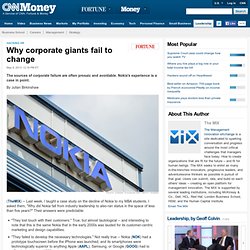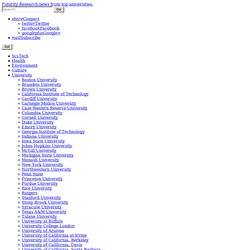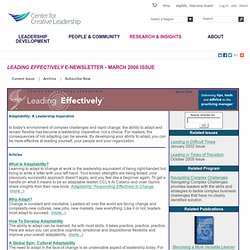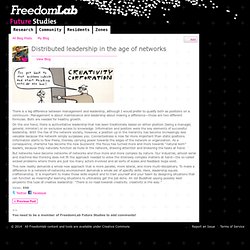

Why corporate giants fail to change. By Julian Birkinshaw (TheMIX) -- Last week, I taught a case study on the decline of Nokia to my MBA students.

I asked them, "Why did Nokia fall from industry leadership to also-ran status in the space of less than five years? " Their answers were predictable: "They lost touch with their customers. " True, but almost tautological -- and interesting to note that this is the same Nokia that in the early 2000s was lauded for its customer-centric marketing and design capabilities. " Through this period, the people at Nokia were aware of the changes going on around them, and they were never short of leading-edge technology or clever marketers.
The failure of big companies to adapt to changing circumstances is one of the fundamental puzzles in the world of business. How to Think Globally. Get ready for the coming employment roller coaster — Cloud Computing News. Body’s ‘pre-feelings’ may detect the future. NORTHWESTERN (US) — Your body may anticipate what’s going to happen—even before your brain has an inkling of what’s to come, researchers report.

Wouldn’t it be amazing if our bodies prepared us for future events that could be very important to us, even if there’s no clue about what those events will be? Presentiment without any external clues may, in fact, exist, according to new research that analyzes the results of 26 studies published between 1978 and 2010. Researchers already know that our subconscious minds sometimes know more than our conscious minds. Physiological measures of subconscious arousal, for instance, tend to show up before conscious awareness that a deck of cards is stacked against us. Are You Strategically Intelligent? On Dreaming the Future. Photo: Presence by maistora.

Rewind to ten years ago. In 2002, the iPod had just hit the market the previous year. Netflix hadn’t had their first profitable year yet. It was still 2 years until Facebook, MySpace, Flickr, GMail, or Orkut were officially introduced. The next year came YouTube, and the following year came Twitter. Windows XP was only a year old, and at the beginning of 2002, IE5 still held about 50% of the browser market.
Group dynamics, process, facilitation, tools. E-Newsletter June 2012: 10 New Leadership Skills. Plus, What Stays the Same? E-Newsletter March 2006: Adaptability: A Leadership Imperative. In today's environment of complex challenges and rapid change, the ability to adapt and remain flexible has become a leadership imperative, not a choice.

For leaders, the consequences of not adapting can be severe. By developing your ability to adapt, you can be more effective at leading yourself, your people and your organization. Articles What Is Adaptability? Learning to adapt to change at work is the leadership equivalent of being right-handed but trying to write a letter with your left hand. Why Adapt? How To Develop Adaptability The ability to adapt can be learned. A Global Spin: Cultural Adaptability The need to adapt in the face of change is an undeniable aspect of leadership today. Strategic Improvisation: Prepare to Adapt Today's leaders must adapt to change and uncertainty - and, more often than not, they must do so in high-pressure settings when speed is essential. Interested in republishing articles or excerpts from a CCL newsletter or CCL Press publication? Recent Topics. Distributed leadership in the age of networks - FreedomLab Future Studies. There is a big difference between management and leadership, although I would prefer to qualify both as positions on a continuum.

Management is about maintenance and leadership about making a difference—those are two different formulas. Both are needed for healthy growth. On the one hand, there is authoritative leadership that has been traditionally based on either position (being a manager, general, minister) or on exclusive access to knowledge. Information and position were the key elements of successful leadership. With the rise of the network society, however, a position up in the hierarchy has become increasingly less valuable because the network simply surpasses you.
But networks have become networks of networks and thus more and more complex by nature. Adapting to a New Normal in Business. How to Develop 5 Critical Thinking Types. IQ, EQ and now VQ – Vision Intelligence. Leaders by their very nature are under pressure to have advanced intellectual and emotional intelligence. In today’s economy, they better add one more – VQ, The Vision Quotient. The pace of change is speeding up. Each and everyday, the competition grows a bit smarter, and more of them from all over the world, extend into your territory. New technologies come on the market and mutate the foundational ways that organizations connect with prospects and complete transactions. Governments tax, regulate, dictate interest rates, and prosecute, and each time they do, the playing field changes. Sadly, we have bred a generation of leaders who are very execution focused and for whom the term “future” simply means the next quarter.
If I were a “follower” in a company and got the choice to pick my muse, I would pick having an accurate future vision as one of the top skills I would want in that leader. I call having an accurate vision of the future being a “high beam” leader.